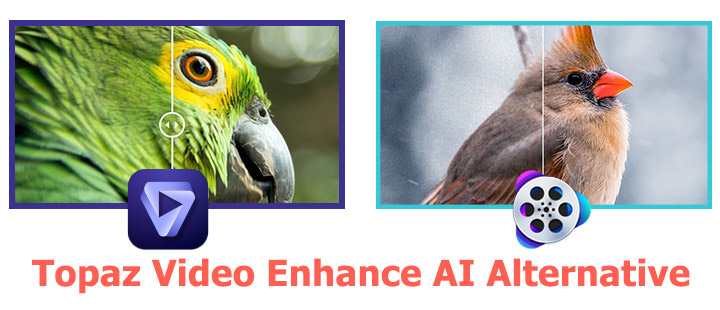"I have several older digital videos with grain and blur recorded in the early 2000s. Topaz did a decent job at cleaning up the video, and I'm wondering if there is a solution of comparable ability…Basically, take an older VHS video and try to make it into 720p clarity. That's what I'm after."
The right video upscaler can be a game-changer for crisp and clear video quality. Topaz Video Enhance AI sets a bar in this field, but there's no one-size-fits-all solution. People may look for a Topaz Video Enhance AI alternative for various reasons - like cost factors and sometimes demanding hardware requirements.

So, this blog delves into the alternative to Topaz Video Enhance AI with hands-on reviews. Whether you want to enhance old family videos or upscale your movie collections, I'd love to share what I've discovered to help you find the best Topaz Video Enhance AI alternative.
| Topaz Video Enhance AI Alternative | ||
|---|---|---|
| Affordable AI video upscaler with decent quality | $25.95/yr for 3 PC | |
AVCLabs Video Enhancer AI |
Video upscaler with higher tech specs | $119.95/yr for 1 PC |
Video2X |
AI upscaler free and open-source on GitHub | Free |
TensorPix |
AI video upscaler online with free trial | €11/mo or pay as you go |
Disclaimer
The test pool includes two videos. One is a realistic-style clip from an old movie, and the other is from an animation-style video. Since the alternatives showed very close upscaling results in the test of the animation-style video, this blog will only display the upgrading results for realistic-style videos. I extracted ten frames from each upscaled video and selected the same frame to show the results.
Clip No.1 is a realistic-style video encoded with the AVC codec. This clip is 15 seconds long, features a resolution of 636x480, and runs at 23.976 fps. Clip No.2 is a 13-second amine-style video encoded with the AVC codec. It features a resolution of 640x480 and runs at 24 fps.
All the tests are conducted on a Windows 10 PC with an Intel Core i7-13700K processor (24 CPUs, ~3.4GHz), 32GB of RAM, and an AMD Radeon RX 7600 graphics card.
1. VideoProc Converter AI
VideoProc Converter AI is an excellent Topaz Video Enhance AI alternative. Just like Topaz, this AI video enhancer allows you to upscale low-res videos by 200%, 300%, and 400% in a fraction of the time. The magic lies in its Super Resolution tool that meticulously refines each pixel. It's trained with tons of reality and anime data rather than simple mathematical algorithms like bicubic or Lanczos resampling.

Navigating VideoProc was a breeze. It's crafted for simplicity, making it a hit for tech novices and seasoned video editors. Coupled with dynamical adjustments of the GPU memory footprint, it achieved the best efficiency and took only 57 seconds to upscale a 15-second, 24fps video four times. As for the results, let's just say it's like seeing your old videos in a new light – literally.

The upscaled image has more clarity and sharpness with finer and more discernible details. The overall quality is improved, with less graininess and better definition, particularly noticeable in the textures and edges around the gantry crane and the railway tracks. VideoProc gracefully enhances the quality, steering clear of those common upscaling pitfalls like blurring or weird artifacts. It's practical for restoring or repurposing older or lower-quality images.
Note: The Windows version now supports AI-powered Super Resolution, Frame Interpolation, and Stabilization to enhance video and image quality. These AI features are not yet available in the Mac version but will be coming soon.
Speed: ~57 seconds
Pros:
- Low system configuration requirements for more CPU and GPU models
- Efficient for old and grainy videos with batch processing support
- High-quality outputs up to 400% and 4K resolution for videos
- Lightweight, user-friendly, real-time dynamically adjusts and preview
- Regular ever-improving AI model updates with software upgrade
- Broad feature set, including AI video stabilization and frame interpolation
Cons:
- Lack of support for Linux systems
- The processing speed is not the fastest in my test. However, it delivers the most stable output results.
 Update: VideoProc Converter AI has introduced two new AI models (Gen Detail & Real Smooth) in Super Resolution for video enhancement, and a "Fast Mode" for much faster video upscaling and enhancing. Now you can enjoy the AI-powered Debluring and Denoising effects at your fingertips. See the video tutorial.
Update: VideoProc Converter AI has introduced two new AI models (Gen Detail & Real Smooth) in Super Resolution for video enhancement, and a "Fast Mode" for much faster video upscaling and enhancing. Now you can enjoy the AI-powered Debluring and Denoising effects at your fingertips. See the video tutorial.
2. AVCLabs Video Enhancer AI
If you search Topaz Video Enhance AI alternative on Reddit, AVCLabs is likely to be on the list. AVCLabs Video Enhancer AI includes multiple AI tools and can efficiently upscale videos to HD, 4K, and 8K resolutions. In our tests, it was only 4 seconds slower than VideoProc Converter AI when upscaling the same video four times. It's worth mentioning that this program also has a facial detail recovery function.

Here's what we get from the upscaling. Excluding the watermark, the quality of this image maintains clarity and sharpness. It makes the details of the industrial setting more visible. And the overall image quality is preserved.

However, please note that AVCLabs Video Enhancer AI demands more robust hardware for video upscaling. You need to consider the higher system requirements before committing.
Speed: ~61 seconds
Pros:
- Streamlined interface with customizable new workflow
- Lots of features, including face refinement, colorization, motion compensation, etc.
- Batch processing is supported.
Cons:
- Huge trial version watermark
- It doesn't allow using different settings for each image when processing in bulk.
- Much higher hardware requirements, potentially slower processing times
3. Video2X
For those looking for an accessible yet powerful upscaling solution, Video2X, the free and open-source Topaz Video Enhance AI alternative on GitHub is a distinctly unique option.

Video2X supports a range of AI models like waifu2x and Anime4K for different upscaling needs, which is very similar to VideoProc Converter AI. They both allow you to apply various algorithms for different videos. Although the Python-based framework underlines its flexibility and adaptability, its GUI version is not as user-friendly as other software at first glance, and it's not available for the latest source code yet. But the good thing is, if you don't have a powerful GPU of your own, you can also use Video2X for free on Google Colab.

Compared with the first two sets of experimental results, Video2X's upscaling has a softer focus, and the details are not as sharp. The overall quality seems to have less definition in textures and edges. The colors also appear slightly more muted. In terms of speed, Video2X is quite slow when upgrading real-life videos. However, it shows an astonishing speed when upgrading anime-styled videos.
Speed: ~94 seconds
Pros:
- Open source, Topaz Video Enhance AI free alternative
- Various algorithm support based on machine learning
Cons:
- Not very fast processing speed on Windows
- A little bit of a learning curve
4. TensorPix
TensorPix could be a solid choice if you are looking for a web-based solution. Just like any video upscaler online, TensorPix is quite novice-friendly and basically has no system requirements. As long as you register an account, you can get a few credits as a free trial. Of course, there are a variety of subscription plans if you use up the free credits.

Without hardware support, the processing speed of TensorPix is quite slow actually. When processing the same video clips, it took four times as long as other desktop software. See the frame extracted from the upgraded video below.

Compared to the previous images, the overall quality seems to be closer to the original. The details, while visible, are not as crisp. It doesn't exhibit the increased sharpness and clarity of the previous images from desktop software. I might rate it lower. It retains the authenticity of the initial photo but does not have the enhancements that come with upscaling processes.
Speed: ~214 seconds
Pros:
- Web-based with no software installation
- Easy to use with free trial
Cons:
- Very limited free trial with a watermark
- Limited upscaling quality and features compared to some desktop applications
Verdict
So that's it. This blog is intended to provide some Topaz Video Enhance AI alternatives based on real testing rather than simply listing the names. As you consider these options, remember the best choice depends on your specific requirements – be it budget, ease of use, or specific features. From the innovative web-based approach of TensorPix to the open-source flexibility of Video2X, there's a solution for every upscaling need.
VideoProc Converter AI is highly recommended. It doesn't come with a high price tag, yet still shows decent processing speed and output quality well above the average in our tests. It won't even put a huge watermark on the output videos with the trial version. Compared with other AI upscaling software, it requires minimal system configuration. No harm in trying. Feel free to download it and give it a shot.
Note: The Windows version now supports AI-powered Super Resolution, Frame Interpolation, and Stabilization to enhance video and image quality. These AI features are not yet available in the Mac version but will be coming soon.

 VideoProc Converter
VideoProc Converter






